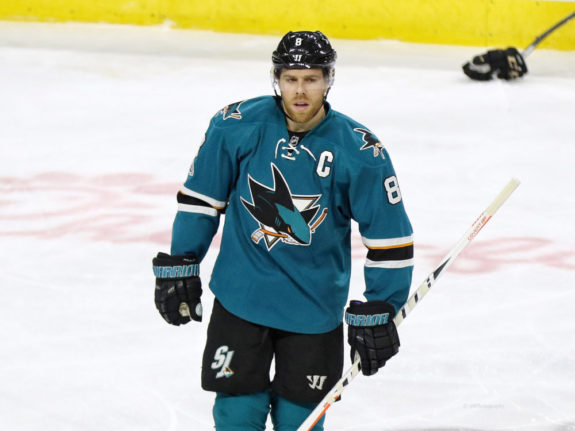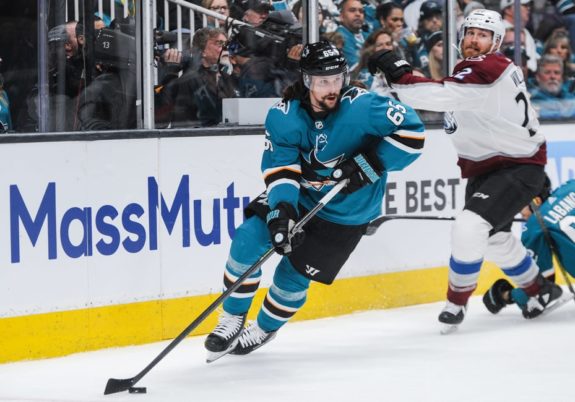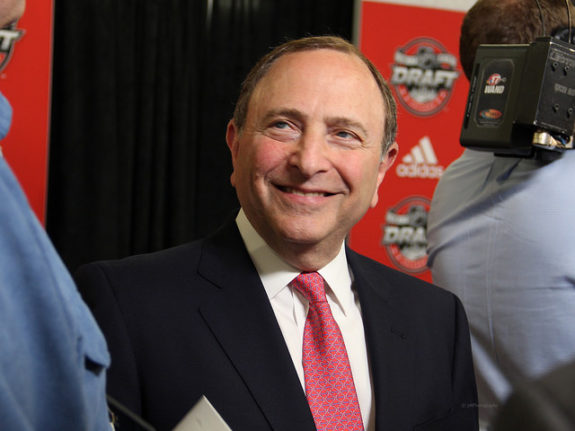There’s been a lot of attention given to the NHL’s excess of officiating problems this playoff season, and for very good reason. The on-ice officials frequently can’t seem to make the right calls, and in many cases, video replay is not available to them based on the circumstances of the play and what is, versus what is not, reviewable.
Related: NHL Playoff Officiating has Been Awful
Consider, for instance, the first-round fiasco that took place in Game 7 between the San Jose Sharks and the Vegas Golden Knights. When Joe Pavelski got tangled awkwardly between Paul Stastny and Cody Eakin and ended up landing on his head, confused officials seemed to guess at what might have actually happened and tossed Eakin from the game over what they saw (or didn’t see) as a vicious crosscheck to the head.

Unfortunately, the play was not subject to video review, so the refs had no way of confirming whether or not an infraction had taken place.
They gambled (wrongly) that one had, and on the ensuing five-minute power play for the Sharks, a combination of anger, adrenaline, and shifting momentum changed everything as the Sharks quickly scored four goals to erase a three-goal deficit and take the lead.
Though Vegas briefly seemed to recover, battling back to tie the game at four goals apiece on a late Jonathan Marchessault tally with the goalie pulled, the Sharks eventually won the game and the series in overtime.
Like it or not, bad officiating had completely altered the course of a playoff series—a situation for which the NHL stunningly apologized to Vegas later on, along with barring the officials from that series from moving on in the playoffs.
Sharks Benefit From Another Blown Call
The Eakin disaster isn’t the only time the Sharks have been the beneficiary of atrocious officiating this postseason.
In overtime of Game 3 of the Western Conference Final versus the St. Louis Blues, a missed hand pass resulted in Erik Karlsson scoring the game-winning goal on a play that, once again, was not reviewable by video.
The win gave the Sharks a crucial and undeserved 2-1 lead in the series and allowed them to regain home-ice advantage.

Even with four officials on the ice, nobody saw the hand pass, which is almost understandable considering the speed of today’s game.
What is not understandable is why a blatantly stolen goal was allowed to stand at such a critical time when a very brief look at the video replay could have easily resolved the matter. NHL Executive VP Colin Campbell later admitted the error in an interview with Sportsnet. Too little, too late.
Related: Sharks Beat Blues – Missed Hand-Pass Leads to Game-Winner
Another instance this playoffs of a missed call that could easily have been caught by video replay occurred on a Columbus Blue Jackets goal in Game 4 of their second-round series with the Boston Bruins.
In this case, the puck deflected up into the mesh netting at the end of the rink before dropping back into play and quickly being deposited into the correct net by Artemi Panarin.

This play should have immediately been blown dead as soon as the puck went over the glass, but all four officials missed what happened, and once again a goal was allowed to stand that should not have been.
Luckily, this one had no impact on the outcome of the game as the Bruins maintained their composure and held on to win by a score of 4-1.
However, the call did allow the Jackets back into the game and may well have shifted the momentum in their direction at a time when a Columbus win would have given them a 3-1 stranglehold on the series. This blown call is, therefore, every bit as egregious as the others.
Potential Solutions & League Concerns
The NHL’s concern, and rightfully so, is that if too many plays are subject to video review, everything will be challenged and games will be extended significantly with long breaks in the action as the refs constantly consult the replay.
The easiest way to fix most of these issues would be by allowing the refs to access video replay across a wider range of scenarios. As has become more and more evident throughout this year’s playoffs, the NHL’s list of reviewable plays is woefully lacking, and by most accounts, the league is reluctant to do anything that might extend the length of its games.
There’s also the question of how far back a play might be challenged. For instance, whether or not a potential offside occurring early in a long sequence of play where the puck goes in and out of the zone multiple times before a goal is finally scored should be reviewable. In my opinion, it should not.
Related: Sharks Comeback Sparked by Injury…Golden Knights Feel Burned
Clearly, there are legitimate concerns about increasing the use of video replay, but even so, I believe that it’s not only manageable but highly preferable to having more games decided by officials getting calls wrong.
The very integrity of the game is what’s at stake here, so getting calls correct has got to be the NHL’s top priority, even at the cost of more replay usage and the possible lengthening of games. After all, that lengthening would likely only be slight.
Consider the Pavelski collision, or the hand pass on Karlsson’s overtime goal—how long would either of these plays have taken to get right with video review?
In light of how long the referees stood around confusedly discussing the goal anyway, I contend that a quick glance at a video replay to confirm or refute Jordan Binnington’s claim of a hand pass would have been much quicker—taking mere seconds, and the right outcome would have been all but assured!
The same goes for the Pavelski play, the Panarin goal, and countless others that have happened already or will happen in the future.
With the speed of the game seemingly increasing all the time, the on-ice officials are all but guaranteed to miss more and more crucial plays in the future, and a quick glance at a video replay tablet will only help them to get the calls right.
NHL Must Act this Off-Season
I’m not suggesting that every possible play be subject to a lengthy video review requiring a showy explanation by the officials, and I’m also not suggesting that coaches be given more than the one video review challenge per game that they already enjoy.
What I am saying, however, is that Gary Bettman and the NHL need to act quickly, taking significant action to ensure that such egregious errors are not repeated in the future.
Something as simple as giving referees the option to quickly check the video replay on a wider variety of plays where they may not be entirely sure exactly what has happened could help considerably.

The NHL could also appoint an off-ice official to monitor each game for potential controversies and let the on-ice crew know when something may be worthy of a quick replay look through an earpiece to one of the refs.
Of course, defining all of the ins and outs of when, where, and how such tools might be used should be the NHL’s top priority this off-season. And they shouldn’t give any weight whatsoever to keeping games short at the expense of making the correct calls. After all, the last thing the NHL needs is another Sharks/Vegas incident on its hands next season.
Related: Golden Knights Looking Toward Next Season
At this time of year, in particular, the stakes are far too great. The correct call must be made in every possible scenario whereby subjectivity (another matter entirely) is not involved, such as on pucks going out of play and on crosschecks to the face that simply didn’t happen.
Getting these crucial calls right must be the NHL’s top priority going forward. The integrity of the game demands it.